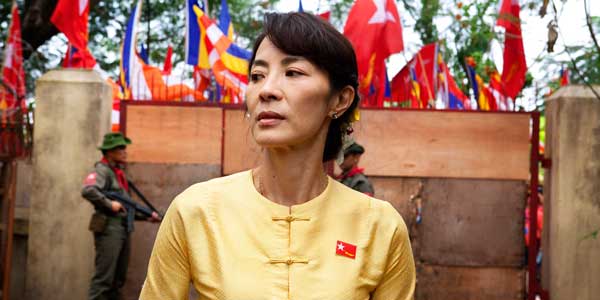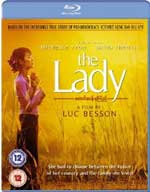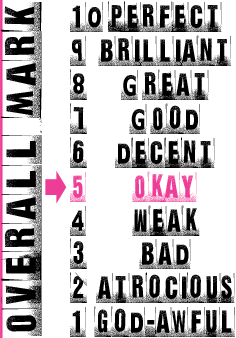
Director: Luc Besson
Running Time: 132 mins
Certificate: 12
Release Date: April 23rd, 2012

Unless you’re a member of Burma’s former military junta, pretty much everyone can agree that Aung San Suu Kyi is a great person who’s had to endure a lot. However she’s also a human being, something The Lady seems to forget. Instead here she’s a saint taking on demons, which results in a film that’s informative but earnest and rather dull.
Aung San Suu Kyi (Michelle Yeoh) is the daughter of the man who negotiated Britain’s independence from Britain but who was assassinated the same year by his political rivals. However, when the film opens she is living as an Oxford housewife with her academic husband, Michael (David Thewlis), and her two children. She then returns to Burma to look after her ailing mother but once there sees the brutality of the military dictatorship, which is suppressing any and all dissent with deadly force.
Those in the country who believe in democracy know that Aung San Suu Kyi’s position as the daughter of a beloved martyr makes her a strong rallying point for their cause, and so she agrees to lead the pro-democracy movement. This puts her in the sights of the military junta, who realise that killing her will only make her a martyr. However as the popularity of her movement grows, they try various ways to silence her, from a rigged election to house arrest. They also begin to use her family against her, hoping that keeping her husband and children away from her in England will either stop her calls for democracy or entice her to leave Burma (knowing she won’t be allowed back if she ever does go).
The film then charts her years of house arrest, which become particularly difficult in 1997 when her husband is diagnosed with prostate cancer. As his illness becomes more serious, the Burmese government refuses to allow him into the country to see his wife, or allow her out with a guarantee she can return. She knows her house arrest sends a powerful statement about her cause, but with her husband dying, the sacrifice seems too great.
The Lady hits DVD and Blu-ray just as reform in Burma mean the now freed Aung San Suu Kyi and many of her pro-democracy colleagues are set to take up seats in the country’s parliament (assuming some issues surrounding the oath they’d have to take is sorted out). Burma certainly isn’t a free country yet, but it’s made strides since this film first went into production (when it started shooting Aung San Suu Kyi was still under house arrest).
The film’s problem is that in the west, most of those who’ve heard of Aung San Suu Kyi know little about what she actually did and see her more as a symbol of peaceful resistance. The Lady never gets past her as that representation of passive defiance, painting her as this almost perfect being who floats magnanimously above all others.
The problem is that there’s more moral complexity to her decisions than the film wants to admit – she decided to put her country ahead of her children, and she decided to push for democracy knowing the potential danger it caused for those around her. They were brave but morally complex decisions, but the film prefers her as perennially put-upon demi-god than admitting the complexity of a real human being. Likewise the Burmese dictatorship was/is a horrible and astonishingly brutal thing, but here it comes across more as a movie monster than anything else.
There is undoubtedly a fascinating movie to be made about Aung San Suu Kyi, but it needs to be less absolute devotion to its subject and have a stronger grasp of the politics it’s dealing with. The awe all those involved felt for the film’s subject is apparent in the ‘making of’ featurette, with Luc Besson in particular coming across as blind to the complexities of Aung San Suu Kyi.
The other special feature is ‘Burma: The Dictatorship Of The Absurd’, in which two French documentarians go undercover as tourists in Burma to bring back a rare look at a country that doesn’t welcome outside journalists. Some of it’s quite interesting, although it would have nice if it at least pretended it wasn’t all about the journalists’ agenda to paint the Burmese government in as bad a light as possible. I don’t doubt it’s bad, but this sort of polemic doesn’t come across as trustworthy.
Overall Verdict: The film looks and sounds good on Blu-ray, it’s just a shame The Lady tips so far into hagiography that even while it perfectly clear this is a fascinating story, the movie makes it less interesting than it might have been, largely by making Aung San Suu Kyi seem too much saint and not enough human.
Reviewer: Tim Isaac





Leave a Reply (if comment does not appear immediately, it may have been held for moderation)